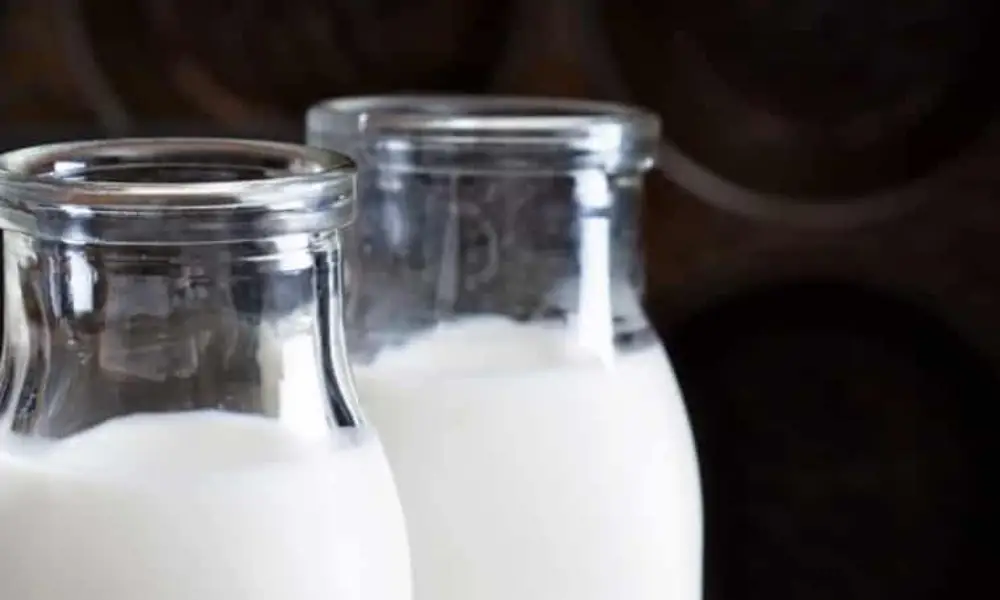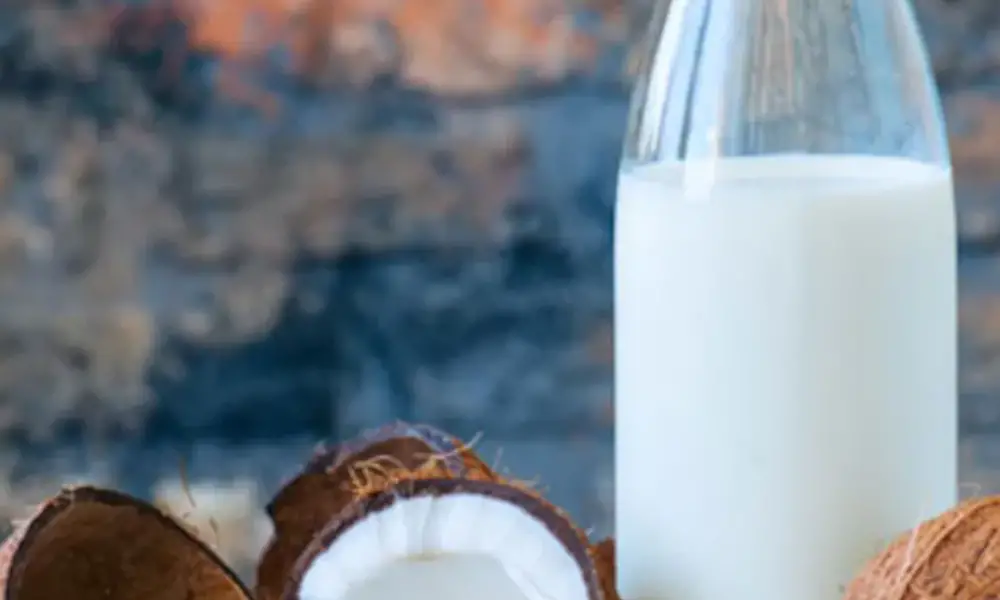Cans and cartons are only a few different packaging options for coconut milk. It can be kept in various methods, including freezing and cooling. We shall look at the shelf life of coconut milk in this article. It’s advisable to read the labels before making a purchase because the shelf life varies depending on the brand and container.
Coconut milk, a dairy-free substitute for cow’s milk with a sweet, nutty flavor, is popular. Coconut milk, like dairy milk, can go bad if it is not stored properly. Find out how to properly preserve coconut milk and spot spoiled milk.

What is Coconut Milk?
An opaque, white liquid called coconut milk is made from the meat of a ripe coconut. Grated coconut meat is combined with hot water and pressed through cheesecloth to create coconut milk the traditional way. A rich, fatty liquid known as coconut cream is produced by this method.
You can refine coconut cream further to create coconut oil or crush it once more to create coconut milk. Coconut milk that has been industrially processed and is available in cans at the grocery store is mechanically grated, squeezed, and frequently stabilized with guar gum.
How to Store Coconut Milk?
You can either prepare fresh coconut milk at home or buy it in a carton or can at the supermarket. Removing remaining coconut milk is unnecessary because recipes frequently call for less coconut milk than an entire can. The following three food preservation strategies will help coconut milk stay fresh longer:
1. At Room Temperature:
Coconut milk can be kept at room temperature for several months if it hasn’t been opened. Canning coconut milk should be kept in a cold, dark area like a pantry or cabinet for optimal results. Some coconut milk cartons are also shelf-stable so that they can be kept for a while or until the expiration date is reached by keeping them in a cold, dark place.
2. Refrigerator:
It is certainly not shelf-stable if you buy a carton of coconut milk from the refrigerated department of a grocery store. Use coconut milk within seven to ten days of opening the carton, and keep the carton in the refrigerator until the indicated expiration date. Use any remaining canned coconut milk within five days and store it in a glass jar or other airtight container in the refrigerator.
3. Freezer:
To store coconut milk for a long time, it can be frozen. Frozen coconut milk will have a gritty texture and lose some of its flavors when defrosted. To freeze coconut milk, split it according to a recipe and place it in separate plastic freezer bags. Until they are frozen, place the bags flat in the freezer. Place a bag of coconut milk in the fridge overnight to defrost. Coconut milk can also be frozen in ice cube trays as an alternative. Coconut milk frozen cubes can be added to smoothies or defrosted and used directly in soups, stews, or Thai curries.
How Long does Coconut Milk Last?
Depending on the variety, storage method, and use, coconut milk has a startlingly wide range of shelf life. One of the criteria is the density of the milk. Longer-lasting than thinner variants are those that are thicker.
The unrefrigerated carton would only last ten days if left unsealed in the refrigerator. However, the same kind, even if kept in the pantry, might be excellent to use within a month if kept closed.
Of course, homemade food has the shortest shelf life. Even if kept in the refrigerator, it will only remain fresh for a few days. The lack of preservatives of this kind is the cause of this.
When kept in the pantry, a closed can be used even after four months, but it must be consumed by the fifth month. However, once opened, it can only be stored in the refrigerator for five days.
Always take note of the date marked on any canned or carton products. You will have a clear idea of shelf life after reading this. But this date is valid if you don’t open it and then adhere to the rules mentioned above. Unopened cans and cartons will last longer without a doubt. But before using it, make sure it’s still fresh.
Benefits of Coconut Milk
Curry, stews, baked goods, and soups taste better when made with coconut milk. It may also be included in smoothies. Coconut milk might be a viable substitute if you have a dairy allergy.
Coconut milk can be found in various products, including yogurt, butter, milk, and creams. It contains healthy fat or good fat.
Reference: Health Benefit of Coconut Milk
Benefits of Homemade Coconut Milk
The advantages mentioned above also apply here. Additionally, the homemade version has no additives, saving you the hassle of comparing the information displayed on the packages sold in stores to pick the one with the fewest ingredients. So go ahead and learn how to make coconut milk at home to add some flavor to your meals.
Different Kinds of Coconut Milk
There are various forms of coconut milk, which are now a staple in our kitchens. The coconut milk used as a non-dairy creamer in the chilled dairy department is very different from the coconut milk sold in cans. Once more, the new version we discover is completely different. We also have handmade coconut milk, which is unquestionably in another league.
The calories are where the change is most noticeable. A cup of full coconut milk in a can has 450 calories. However, the same amount of coconut milk in a refrigerator has only 45 calories.
Does Coconut Milk Curdle in the Heat?
Coconut milk will separate into a thin, watery liquid with white lumps when heated on high heat. If coconut milk is kept at room temperature in a heated environment for a long time, this type of curdling may also occur.
Because coconut milk includes proteins and oils, adding heat causes it to curdle. As the temperature rises, curdling worsens because the heat helps separate the oil and protein from the liquid, causing it to clump together. The clumps make the coconut milk taste and feel terrible.
Can You Freeze Coconut Milk?
Although coconut milk can be frozen, it might lose some flavor and texture. The easiest method to prevent this is only to freeze tiny amounts at a time. You can only defrost what you need in this manner. Additionally, coconut milk has a tendency to get slightly sour, so you should always thaw it out gradually.
Does Coconut Milk Go Bad?
While coconut milk in sealed, unopened containers can last for several months, cans and cartons of coconut milk degrade once opened. When kept in an airtight container and properly maintained in the refrigerator, fresh, handmade coconut milk keeps for up to five days. Glass jars and airtight plastic containers are both suitable.
The shelf life of your coconut milk may only be a few days if you use this technique. You can also cover an open can of coconut milk with plastic wrap or aluminum foil. If your coconut milk smells terrible, tastes bad, looks grey, or if it curdles or has mold in it, you’ll know it’s rotten.
How do You Know if Refrigerated Coconut Milk is Bad?
Coconut milk will smell foul and possibly include mold if it is rotten. Additionally, it could be chunky, deeper in color, and curdling. The easiest approach to protect canned goods and cartons of coconut milk from going bad is to store them all in a dry, dark place away from moisture.
How Long can You Keep Leftover Coconut Milk?
We’ve discovered that leftover coconut milk keeps well for up to a week in the refrigerator, but we were curious if we might extend its shelf life even further by freezing it. We bought our favorite brands, put the milk in airtight containers, and put them in the freezer until they were completely frozen.
When Should You Throw Out Coconut Milk?
How do you determine whether coconut milk in a can is contaminated or bad? The best method is to smell and inspect the canned coconut milk; if it acquires an unpleasant flavor, odor, or appearance, it should be thrown away. All coconut milk in cans should be thrown out if they are leaking, rusting, bulging, or excessively dented.
What does Spoiled Coconut Milk Smell Like?
If the milk smells sour or rancid, it shouldn’t be consumed. The coconut milk has soured, and the container needs to be thrown away if it seems swollen or bulging. Coconut milk is a wonderful ingredient to use in cooking; just make sure you smell it first.
How is Coconut Milk Made?
Grated coconut meat is combined with hot water and pressed through a cheesecloth to create coconut milk the traditional way. A rich, fatty liquid known as coconut cream is produced by this method. To make coconut oil or coconut milk, coconut cream can be further processed.
Coconut milk is less nutrient-dense than dairy milk when compared to milk. Although several kinds of coconut milk contain calcium, vitamins A, B12, and D, they are all enriched.
Conclusion
After opening, coconut milk is typically safe for up to two years. To prevent spoiling, coconut milk must be kept in the refrigerator for at least a week after being opened. Temperature variations, the amount of oil in the coconut, and the proportion of water in coconuts are just a few factors that might cause curdling. But this doesn’t always imply that the milk is bad.
Coconut milk that has been opened in a can separates after roughly a day. You can heat it to turn it back into a liquid. The coconut milk can, however, pick up the flavors of other items in the refrigerator if the can is not kept cool. It can also absorb the can’s metallic flavor.

